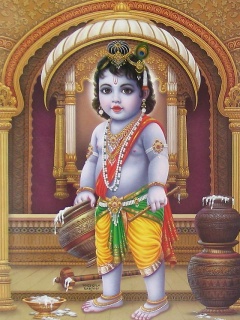भाद्रपद शुक्ल नवमी , मंगलवार , विक्रम संवत २०६८
How to be Saved from the Fear of Death
Desire is at the root of all sufferings of this world. Without desire for pleasures, no suffering can ever come. This should happen and this should not happen (i.e. It should be or it should not be so), this desire itself has all the sufferings in it. At the time of death the horrendous pain that one experiences, that too is faced by only those people who desire to live, because he wishes to live, and yet has to die. If there is no desire to live, then at the time of death one would have no pain. Just as when childhood departs and youth comes along and youth departs and old age comes along, no difficulty is experienced, so also should there be no suffering on giving up of the body. The Gita says -
Dehinosminyathaa dehe koumaaram youvanam jaraa |
Tathaa dehaantrapraaptirdheerastatra na muhyati || (Gita 2/13)
"Just as boyhood, youth and old age – changes in the physical body of the soul do not affect the soul similar is the change to another body. A wise man never gets disturbed about it."
Vaasaansi jeernaai yathaa vihaaya navaani gruhnaati naroparaani |
Tathaa shariraani vihaaya jeernaanyanyaani sanyaati navaani dehi || (Gita 2/22)
"Just as a person casts off old clothes and puts on new ones, so does the self discard old bodies and acquire new ones."
Due to the false sense of I-ness and My-ness vested in the body, a person wishes to live and is afraid of death; the reason being, that the body is perishable and the soul is eternal (non-destructible) and nobody can destroy it - "vinaashamavyayasyaasya na kaschitkartumarhti" (Gita 2/17) ;
"none can bring about the destruction of the Atma" and "na hanyate hanyamaane shareere" (Gita 2/20); "The Self (soul) can never be killed, even when the body is slain."
Raam mare to mein maru, nahin to mare balaaya|
Avinaashi kaa baalakaa, mare na maaraa jaaya ||
"If Rama dies, then I die otherwise why should I die? The eternal part (ansh) of God neither dies nor is killed."
The body dies every second and it does not stay still for a moment, while the soul ever remains the same and does not change at all. The desire to live or the fear of death neither affects the body, nor the soul, but affects those beings that even though they are immortal, identify themselves with tht perishable body (through the sense of "I" and "Mine"). To treat one's body as the self is lack of discrimination, it is heedlessness and this heedlessness tantamount to death - "Pramaado vai mrutyuh" (Maharabharat, Udyoga 42/4).
A person domiciled in Nature (Prakriti) becomes a co-sharer of pain and pleasure - "Purusha prakrutistho hi bunkte prakrutijaangunaan" (Gita 13/21); "When the Purusha (the self) is seated in Prakriti (Nature), their union results in good or bad births." The soul vests in Nature, through lack of understanding. To treat the soul as one's body and the body as the soul, is ignorance, which causes all sufferings. The result is that a person wishes to hold on to his mortal body and does not aspire to realize his immortal self, that is what causes him to suffer, If he does not mistakenly consider the perishable body as his true self, and knows the true nature of the self, then he would not suffer.
From "Vasudeva Sarvam" in Hindi and "All is God" by Swami Ramsukhdasji
From "Vasudeva Sarvam" in Hindi and "All is God" by Swami Ramsukhdasji
